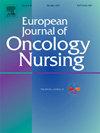Heterogeneity of depression trajectories and associated risk factors during radiotherapy in patients with gastrointestinal cancer: A longitudinal study
IF 2.7
3区 医学
Q1 NURSING
引用次数: 0
Abstract
Purpose
To identify the heterogeneity in depression trajectories and factors influencing depression during radiotherapy in patients with gastrointestinal cancer.
Methods
Between August 2023 and May 2024, we longitudinally tracked the symptoms of 146 patients with gastrointestinal cancer at T0 (pre-radiotherapy), T1 (mid-radiotherapy), and T2 (1-month post-radiotherapy). Group-based trajectory models were used to identify subgroups of depression trajectories. A fit-criteria assessment plot was used to assess the accuracy of grouping, and univariate and multivariate logistic regression models were used to analyze the potential independent factors associated with the subgroups.
Results
Patients were categorized into three subgroups: no depression (31.5 %), mild depression (54.1 %), and moderate depression (14.4 %) group. Patients aged >65 years (P < 0.05), those with a malnutrition-inflammation complex (P < 0.05), and those accompanied by children (P < 0.05) were more likely to belong to the moderate depression group. Between-group and within-group differences in psychoneurologic symptoms, such as fatigue, remained consistent with depression. Depressive symptoms were most severe mid-radiotherapy, and moderately depressed patients were at risk of developing major depression.
Conclusions
There was significant heterogeneity in depression during radiotherapy among patients with gastrointestinal cancer. Clinicians should focus on identifying high-risk patients with depression aged >65 years, those with a malnutrition-inflammation complex, and those accompanied by children. They should actively implement pharmacological and non-pharmacological treatments and refer them to specialized psychological clinics, if necessary, to prevent the occurrence of major depression.
胃肠癌患者放疗期间抑郁轨迹及相关危险因素的异质性:一项纵向研究
目的探讨胃肠癌放疗患者抑郁轨迹的异质性及影响抑郁的因素。方法在2023年8月至2024年5月期间,我们对146例胃肠道肿瘤患者在T0(放疗前)、T1(放疗中)和T2(放疗后1个月)的症状进行了纵向追踪。使用基于组的轨迹模型来识别抑郁轨迹的亚组。采用拟合标准评估图评估分组的准确性,采用单因素和多因素logistic回归模型分析与亚组相关的潜在独立因素。结果将患者分为无抑郁(31.5%)、轻度抑郁(54.1%)和中度抑郁(14.4%)3个亚组。65岁患者(P <;0.05),营养不良-炎症复合物(P <;0.05),有儿童陪同者(P <;0.05)更有可能属于中度抑郁组。精神神经症状(如疲劳)的组间和组内差异与抑郁症保持一致。放疗中期抑郁症状最为严重,中度抑郁患者有发展为重度抑郁的风险。结论胃肠道肿瘤患者放疗期间抑郁情绪存在显著异质性。临床医生应重点鉴别65岁以上的抑郁症高危患者、营养不良-炎症复合物患者以及伴有儿童的患者。应积极实施药物和非药物治疗,必要时转诊到专门的心理诊所,预防重度抑郁症的发生。
本文章由计算机程序翻译,如有差异,请以英文原文为准。
求助全文
约1分钟内获得全文
求助全文
来源期刊
CiteScore
4.40
自引率
3.60%
发文量
109
审稿时长
57 days
期刊介绍:
The European Journal of Oncology Nursing is an international journal which publishes research of direct relevance to patient care, nurse education, management and policy development. EJON is proud to be the official journal of the European Oncology Nursing Society.
The journal publishes the following types of papers:
• Original research articles
• Review articles

 求助内容:
求助内容: 应助结果提醒方式:
应助结果提醒方式:


